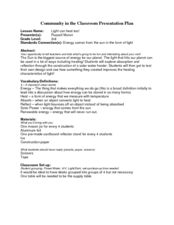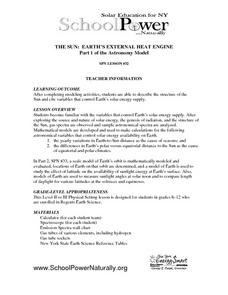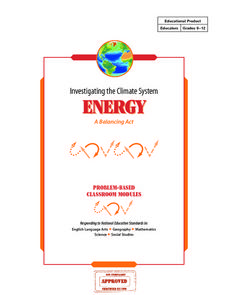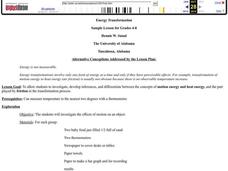Curated OER
What is Energy? Different Kinds of Energy
Introduce physical science learners to the forms of energy using this PowerPoint. The concluding slides present scenarios for discussing the transfer of energy from one form to another. Informative text is crisp and attractive, but the...
Virginia Department of Education
Molar Heat of Fusion for Water
How can you describe heat of fusion in a way the class understands and relates the importance of this concept to present day issues? In this third lesson of the series, learners conduct an experiment, demonstrating the flow of heat...
Concord Consortium
Specific Heat and Latent Heat in Condensation
There's more to melting than meets the eye! Junior physical chemists investigate the differences between specific and latent heats as a substance undergoes a phase change. Users remove heat from the system and observe changes in kinetic...
Curated OER
Light Can Heat Too!
Third graders explore absorption and reflection of light energy. In this solar energy lesson, 3rd graders explore how light energy transfers to heat energy through the construction of a solar water heater. Students will discuss and...
Curated OER
Heat Energy - Energy Transfer
Here's a great selection of slides for a class being introduced to heat transfer. Types of materials that are good conductors or insulators are covered and the diagrams that accompany the information should make understanding more...
Oceanic Research Group
Heat Transfer and Cooling
Astronauts train underwater to simulate the change in gravity. An out-of-this-world unit includes three hands-on activities, one teacher demonstration, and a discussion related to some of the challenges astronauts face. Scholars apply...
Scholastic
Study Jams! Heat
Raise the temperature in your class with this hot film! Cartoon teens discuss thermal energy, the conservation and transfer of energy, three methods of heat transfer, conductors, and insulators. The publisher effectively packed every...
Cornell University
Energy Changes in Chemical Reactions
The heat of solution measures how much thermal energy a dissolving substance consumes or gives off. The experiment demonstrates both endothermic and exothermic reactions. Scholars dissolve several substances, measure the temperature...
eGFI
Lesson: Zero-Energy Home Design
Challenge young engineers to design a one-bedroom scale house to collect and maintain as much heat as possible. Particular constraints must be adhered to, but creativity is also allowed. Included is a diagram and background information...
American Chemical Society
The Energy Efficiency of Heating Water
Can a small change in laboratory procedures save energy? Scholars test three different methods for heating water in a science lab. Then, they calculate the energy efficiency for each and compare them to determine which uses the least...
Kenan Fellows
What Is Heat?
If objects have no heat, how do they can gain and lose it? Scholars experiment with heat, temperature, and specific heat of various substances. They create definitions for these terms based on their own conclusions to complete the fourth...
NOAA
The Great, Glowing Orb What You Will Do: Make a Solar Heat Engine
How is solar energy able to move wind and water to control the climate? Scholars explore the concept of solar energy in the first of 10 activities in the Discover Your Changing World series. They follow instructions to build homemade...
University of Georgia
Heating and Cooling of Land Forms
Compare heating and cooling rates of different land forms. A lab activity has groups collect data on the rate of heating and cooling of soil, grass, saltwater, fresh water, and sand. An analysis of the rates shows how the different land...
American Chemical Society
Energy and Entropy of a Stretched Rubber Band
Stephen Perry invented and patented the modern rubber band in 1845. Young scientists put his discovery to work as they use rubber bands to observe entropy and enthalpy. They determine the change in free energy to figure out if it...
Curated OER
Transferring Thermal Energy
Multiple examples of heat transfer through different materials are shown. The information will reinforce concepts of particle energy change and movement at a early, secondary level.
Curated OER
Incoming Solar Radiation
Demonstrate how the spherical shape of the Earth contributes to unequal heating of its surface and results in varying climates at different latitudes. This would be an illuminating addition to your meteorology lessons, especially when...
Curated OER
The Sun: Earth's External Heat Engine - Part 1 of the Astronomy Model
Designed by School Power...NaturallySM, this lesson plan familiarizes advanced earth science and physics learners about the variables that affect our supply of solar energy. They examine gas spectra and perform calculations. There is an...
Space Awareness
Water is a Heat Sink
One of the key objectives of Europe's Copernicus Earth program is to monitor the temperatures of the oceans and seas on Earth. Young scholars learn the effects of different heat capacities through two experiments. These experiments...
Curated OER
Heating and Cooling a Really Large Lizard
Remind your middle school scientists how fox ear size varies depending on the climate they live in; large ears allow heat loss while small ears keep heat in. Discuss how a cold-blooded animal might try to regulate body temperature. Then...
Carnegie Mellon University
Home Energy Audit
Youngsters make a mental assessment of electricity-consuming appliances in their homes and then evaluate them for the amount of energy consumed. They learn how to use power meters and measure the electrical consumption of several...
Curated OER
Investigating the Climate System: Energy, A Balancing Act
Earth science explorers design an experiment to demonstrate that the albedo of a surface affects its temperature. They test to find out if moisture on the surface affects temperature. They discover whether or not concrete or asphalt heat...
Curated OER
Producing Energy From Fossil Fuels and Renewable Sources
All types of energy are presented here, with neat pictures and labels to illustrate the technology typically used. Ways of harnessing the energy most efficiently are discussed, and good examples provide starters for further research....
Curated OER
Energy Transformation
Learners experiment with variety of materials to investigate, develop inferences, and differentiate between concepts of motion energy and heat energy, and the part played by friction in the transformation process.
Texas State Energy Conservation Office
Nuts! Calculating Thermal Efficiency
Oh nuts! Do macadamias or almonds produce more thermal energy? Energy enthusiasts find out with this experiment. The objective is to demonstrate to your class how the chemical energy contained in foods can be converted into useable...

























